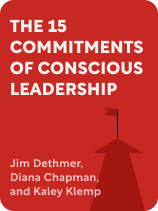

This article is an excerpt from the Shortform book guide to "The 15 Commitments of Conscious Leadership" by Jim Dethmer, Diana Chapman, and Kaley Klemp. Shortform has the world's best summaries and analyses of books you should be reading.
Like this article? Sign up for a free trial here.
How does being open-minded make you a better leader? Why should you be willing to listen to other people’s perspectives?
Being a leader isn’t just about taking control and giving orders. According to The 15 Commitments of Conscious Leadership, it’s also about humbling yourself and taking the time to see other people’s points of view.
Learn how to be a more open-minded leader who listens to others.
Open-Mindedness in Leadership
The authors argue that to be an effective leader, you must be willing to change your beliefs, admit when you’re wrong, and listen to opposing perspectives. Being an open-minded leader will help you gain a more accurate and complete view of reality, aiding problem-solving and decision-making.
(Shortform note: While the authors frame open-mindedness as something that overwhelmingly benefits leaders and enhances problem-solving, others warn that it can have downsides. For example, being too willing to consider others’ perspectives might make you less confident in your ideas and beliefs and more easily persuaded by bad ideas. These traits may trigger ineffective leadership by negatively impacting your problem-solving and decision-making abilities.)
Further, learning how to be more open-minded is important for managing relationships. Being closed-minded leads to defensiveness. It can make you see people who don’t align with your perspective as enemies. This causes a workplace culture of competition and polarization, which ultimately leads to the deterioration of relationships, low employee satisfaction, and increased employee turnover.
(Shortform note: Some experts note that closed-mindedness can harm not only workplace relationships but also personal and romantic relationships. They explain that this is largely because closed-minded people cling to the status quo and social norms, even when these norms don’t work for them or contradict what they truly desire. For example, someone may give up their dream of being an artist and become a scientist instead because it’s more “socially acceptable.” These people’s unrealized desires cause their lives to lack meaning, and they become bitter and resentful toward others.)
How to Be Open-Minded
The authors recommend practicing two techniques to foster open-mindedness.
Technique #1: Soothe Your Defensiveness
According to the authors, one way to foster open-mindedness is to soothe the closed-minded, defensive response that bubbles up when you’re faced with something or someone you disagree with. You can do this by taking slow, deep breaths, sitting up straight, and relaxing your posture. This soothes your strong feelings and returns you to a more open-minded state.
(Shortform note: If you practice this technique but still feel defensiveness bubbling up, it may be best to temporarily leave the conversation until you’ve calmed down. That way, you’ll de-escalate the situation and avoid saying something hurtful (or closed-minded) out of frustration.)
Technique #2: View Everyone as a Helper
The authors also recommend viewing everyone you encounter as a helper—someone who’ll support you to learn and grow in a new way. This includes people causing you problems or posing a challenge: In these situations, stay open-minded and consider how this difficult experience will serve you going forward.
(Shortform note: When faced with someone who’s causing you problems, it may be hard to see them as a helper—instead, it’s arguably more natural to feel angry or frustrated with this person. Letting yourself feel and express that anger may be more healthy than simply trying to see the best in the situation: In The Upside of Your Dark Side, Todd Kashdan and Robert Biswas-Diener argue that hiding anger is unhealthy and can increase the likelihood of developing bronchitis and heart attacks.)

———End of Preview———
Like what you just read? Read the rest of the world's best book summary and analysis of Jim Dethmer, Diana Chapman, and Kaley Klemp's "The 15 Commitments of Conscious Leadership" at Shortform.
Here's what you'll find in our full The 15 Commitments of Conscious Leadership summary:
- Why many leadership models are unsustainable in the long term
- Why leaders must learn to understand and manage their emotions
- The 15 commitments that leaders must uphold to run an effective organization






